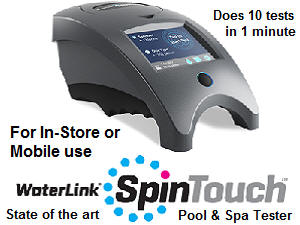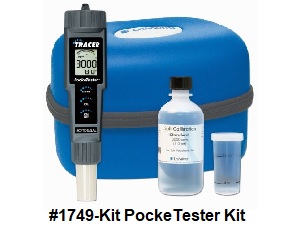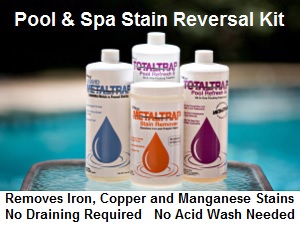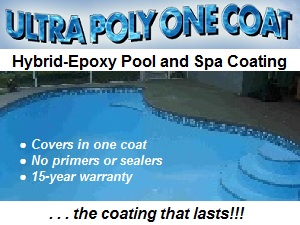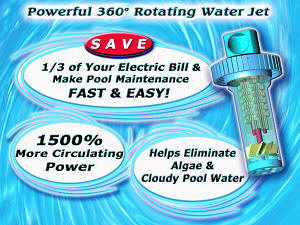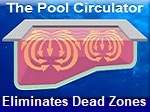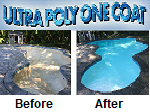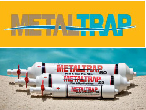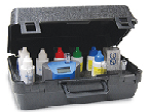| |
|
Scroll
down to browse through some archived SWIMMING POOL
questions and answers. Please click the Pool
Problems Link, on top of every page, to access a complete
listing of Pool Problem subjects, an alphabetized
Website Table of Contents, Pool Equipment Information,
About Alan Biographic Material and a Pool Glossary. Use
the other links to access additional subject
information. More information about some new and unique
products, for pools and spas, can be found by visiting
The Website Store.
You'll never know what you'll find and that's always
fun. Be better prepared and avoid costly problems!
|
|
 |
Shipping is FREE* . . . within
the Continental U.S.
A $9.99
handling charge will apply
to Continental U.S. Orders,
under $75.00. Orders
outside of the Continental
U.S. may require some
additional charge, based on
quantity and destination.
Most products can be shipped
World-Wide. International
and orders outside of
Continental U.S. - see
comments on the ordering
pages. |
|
 |

Major
Credit Cards and PayPal are accepted. |
|
On-line
shopping since 2002 - Safe and Secure!!! |
|
Managing Corrosion in a swimming pool. |
|
Corrosive
conditions can exist in a swimming pool,
when the pH is maintained too low and is
made worse, if the total alkalinity and
calcium hardness are too low, as well.
This can adversely effect the metal
parts in the pool and through which the
water flows, such as ladders, rails,
underwater light, heaters, pumps and
filters.
A
ColorQ 2X is a 2nd generation,
Bluetooth, Waterproof, all-digital tester,
that can
measure all the common test factors. There is a model, for every sanitizing
need. The
WaterLink SpinTouch Labs
are the ultimate tester, doing
up to 10 different water test
factors, in just 1 minute.
Voted product of the year.
An
Electronic PockeTester Kit,
can monitor high TDS (Total Dissolved
Solids), that could leak to scale
formation and some types of corrosion. |
|
|
If you have a pool or spa water testing
need, we should have the product.
►
Scroll down to read through some
Question & Answer information.
◄
|
|
How to treat and prevent corrosive pool
water conditions? |
Corrosive pool
conditions can cause a variety of pool problems
and should be avoided, by maintaining the water
chemistry as close to the optimum ranges, as
possible. A
ColorQ
All-Digital Tester allows you to do all the important
tests, without any color-matching or guesswork and is your
first line of defense against corrosive conditions. Corrosion can result in damage to
underwater metal surfaces and equipment, damage
or even the destruction of copper heat
exchangers, etching of masonry pool surfaces,
wrinkle formation in vinyl liners and an
increase in the irritability of chlorine or
bromine pool water sanitizers. The corrosion of
metal parts can release, into the water, metal
ions that may lead to staining and/or
discoloration. Corrosive conditions can be
eliminated or controlled by the adjustment of
the pH, total alkalinity and calcium hardness.
Corrosion of Stainless Steel Ladders, Steps and
rails can be avoided, by the use of
maintenance-free, Composite products.
If problems arise, refer to the
Pool Problems Page, as
a source of problem-solving information, broken down into
various categories. Scroll down the page and click on the linked
keywords,
catch phrases
or images, in the archived answers below, to access additional information, on that topic or product.
Do you know what's in
your water? If you're having problems, with
corrosion, stains or discoloration, you should be testing
for pH. Total Alkalinity, iron and copper, to better
understand the extent and cause of the problem. This
helps select the best treatment option.
Understanding the nature of the problem, should be step one.
For information about our full selection of testing options,
visit our Test
Equipment Store. For information about treatment
options, visit our Stain Treatments
Store.
 |
Join our E-Letter Mailing List.
You'll receive 1-3 E-Letters a
month, featuring helpful pool
and spa advice, new product
information and sale
announcements. All we
require is your e-mail address
and you can opt out anytime you
wish.
Your information
will never be shared or sold. |
|
▼
Helpful,
Problem-Solving Information, in a question and
answer format.
▼ |
►
Will Cyanuric Acid Cause Heater Corrosion?
Will excessive cyanuric acid
corrode the tubes in a pool heaters heat
exchanger?
Fred, 5/4/2020
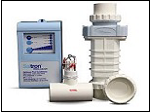
A pH lower than 7.0, with chlorine or
bromine present, will corrode heaters. The
lower the pH, the faster it will proceed.
That is one of the reasons the pH should be
maintained at 7/2-7.8. High levels of
cyanuric acid will impede the effectiveness
of chlorine. The latest industry research
suggests that 50 PPM
is the maximum, that should be maintained.
If you want to use chlorine and avoid the
buildup of cyanuric acid, you should
consider a
salt chlorine generator. It is the
better way to use chlorine.
Sincerely. Alan Schuster, 5/4/2020
►
Corrosion And The Salt/TDS Level?
I have a 15' above
ground pool, 48" deep. thinking of changing
to salt system when having new liner
installed, shortly. However, pool
stores said because of the metal pool and
aluminum top rail, not to use a salt system,
due to salt corroding my pool and deck
around pool and other items including my
heater? Is this true? But, now that I saw
your site, I am thinking of borax or
something like it in my chlorine pool?
What is better for me? Thanks.
Barb, 7/14/2018
When 2 different metals are in immediate
contact with one another, corrosion can take
place, due to the presence of dissolved
salts. Most manufacturers are aware of this
and have taken appropriate design steps. The
dissolved salts are not limited to sodium
chloride (common salt), but also included
calcium salts, lithium salts, potassium
salts, borates and byproducts, from all
types of chlorine.
You don't have to have a
salt chlorine generator to have a high
salt of TDS (Total Dissolved Salts). A pool
professional from Arizona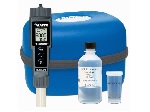 ,
after having bought a
Salt/TDS tester, from our website
decided to test the tap and pool water. He
knew the tap water was high in dissolved
salts. It tested 800
PPM. The pool which was refilled 18 months
ago, tested 2000 PPM. Thinking something was
wrong with the tester, he wrote me. I told
him there was nothing wrong with the tester
and there was an easy explanation. It would
not be uncommon, for a pool in Arizona, to
lose 2-inches of water a week, due to
evaporation. With a depth of close to
100-inches, that represents 2% weekly. That
means that the Salt/TDS will rise by 2% of
800 PPM, every week. That amounts to a rise
of 16 PPM, on a weekly basis, without adding
in the contributions, from standard pool
chemicals. Over the period of 18 months, the
Salt/TDS will increase by around 1200 PPM.
This is why the pool tested at 2000 PPM. ,
after having bought a
Salt/TDS tester, from our website
decided to test the tap and pool water. He
knew the tap water was high in dissolved
salts. It tested 800
PPM. The pool which was refilled 18 months
ago, tested 2000 PPM. Thinking something was
wrong with the tester, he wrote me. I told
him there was nothing wrong with the tester
and there was an easy explanation. It would
not be uncommon, for a pool in Arizona, to
lose 2-inches of water a week, due to
evaporation. With a depth of close to
100-inches, that represents 2% weekly. That
means that the Salt/TDS will rise by 2% of
800 PPM, every week. That amounts to a rise
of 16 PPM, on a weekly basis, without adding
in the contributions, from standard pool
chemicals. Over the period of 18 months, the
Salt/TDS will increase by around 1200 PPM.
This is why the pool tested at 2000 PPM.
Dissolved chemicals can be corrosion to
metals, which is why they are made to be
corrosion resistant. Hosing off the metal
surfaces can help avoid problems, which can
occur with or without a salt chlorine
generator being present. Copper heater
corrosion will occur, if the pH is under 7.0
and chlorine or bromine are present. This
has nothing to do with salt chlorine
generators, which actually tend to prevent
low pH conditions. Many companies
manufacture both salt chlorine generators
and heaters, without feeling the need for a
cautionary warning.
Dealers like to sell chemicals and a salt
chlorine generator does reduce chemical
usage. Borates can be used with or
with a salt chlorine and do help reduce, but
not eliminate, chlorine usage, by helping to
control algae. Pools of all types are
continuing to switch to salt chlorine
generators, based on its convenience and
performance. I hope that the
information provided was helpful.
Sincerely. Alan Schuster, 7/14/2018
►
Corrosion And Rust In The Pool Enclosure?
Hi Alan. I work
for a small pool company in NS Canada.
I have a customer that we recently installed
a small in ground pool for with a UV
Sterilizer and a Bromine Feeder installed on
it. The customer decided to make the pool an
indoor pool and contracted a company to
install a humidity control system. The
customer is having major rusting issues now.
We have installed pools like this before and
we service pools that are indoor with
similar humidity systems, etc. What do
you think may be causing the customers
issues? We have asked the customer to
get their water tested, but they haven't, as
of yet. Thanks!
Christine C., Nova Scotia, Canada, 9/8/2018
Your last sentence says it all. Bromine
tablets, as are chlorine tablets, are acidic
and will require reg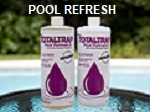 ular
additions of soda ash, to maintain an
optimum pH of 7.2-7.8. I surmise that you
will find that the pH is very low.
Too low to read
on most pool testers. It is the acidic
vapors that are causing the rusting. He has
lulled himself into a false sense of
security, by not testing the water on a
regular basis. It would be safe to assume
that the pool has a heater. If that is the
case, the acidic water will be corroding the
copper heat exchanger. Raising the pH will
probably result in discoloration and
staining. I would have the water tested for
copper and plan on treating the problem, as
the pH is raised. I would add use
Pool Refresh,
which is a 2-part product, that removes the
dissolved copper, by vacuuming and filtering
it out of the water. Alternately, you
could add a dose of
liquid MetalTrap,
for each 0.5 PPM of copper, to be on the
safe side. They will probably blame you, but
you seem to have done what was required.
They dropped the ball. I hope that the
information provided was helpful. ular
additions of soda ash, to maintain an
optimum pH of 7.2-7.8. I surmise that you
will find that the pH is very low.
Too low to read
on most pool testers. It is the acidic
vapors that are causing the rusting. He has
lulled himself into a false sense of
security, by not testing the water on a
regular basis. It would be safe to assume
that the pool has a heater. If that is the
case, the acidic water will be corroding the
copper heat exchanger. Raising the pH will
probably result in discoloration and
staining. I would have the water tested for
copper and plan on treating the problem, as
the pH is raised. I would add use
Pool Refresh,
which is a 2-part product, that removes the
dissolved copper, by vacuuming and filtering
it out of the water. Alternately, you
could add a dose of
liquid MetalTrap,
for each 0.5 PPM of copper, to be on the
safe side. They will probably blame you, but
you seem to have done what was required.
They dropped the ball. I hope that the
information provided was helpful.
Sincerely. Alan Schuster. 9/8/2018
►
Copper Heater Corrosion?
Hi Alan, I
would like to know if ordering a pH
controller system would stop the problem I'm
having with my pool heater getting small pin
holes on the copper pipes. Would it be able
to fix my problem, if I order this unit?
According to the pool heater manufacturer,
the chemistry in the water is what causes
this problem.
Art, 11/7/2015
A pH Controller is not
a solution, for this situation, as it is
designed to lower the pH. Your problem stems
from having too low a pH, while chlorine or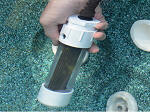 bromine is present. Most likely, you are
using trichlor tablets in a feeder that is
not separately, from the heater by a check
valve or chlor is being used and the
resulting drop in pH is not being raised.
Trichlor is acidic and its use requires
regular addition of pH Increaser. It
is acidic conditions, with chlorine or
bromine present, that causes copper
corrosion. If you switch to a salt
chlorine generator, you will avoid the low
pH conditions, that lead to copper
corrosion. A
salt chlorine generator
raises the pH, as chlorine is produced, so
it is unlikely there is will copper
corrosion. If you install a salt chlorine
generator, your pH will trend upwards, so
corrosive pool water is not likely, unless
you get very heavy-handed with additions of
acid.
bromine is present. Most likely, you are
using trichlor tablets in a feeder that is
not separately, from the heater by a check
valve or chlor is being used and the
resulting drop in pH is not being raised.
Trichlor is acidic and its use requires
regular addition of pH Increaser. It
is acidic conditions, with chlorine or
bromine present, that causes copper
corrosion. If you switch to a salt
chlorine generator, you will avoid the low
pH conditions, that lead to copper
corrosion. A
salt chlorine generator
raises the pH, as chlorine is produced, so
it is unlikely there is will copper
corrosion. If you install a salt chlorine
generator, your pH will trend upwards, so
corrosive pool water is not likely, unless
you get very heavy-handed with additions of
acid.
Sincerely.
Alan Schuster, 11/8/2015
► Pitting On The
Pool Ladder?
The ladder on my above the ground pool
is aluminum and has become pitted. What causes this and what
can I do?
J. M., 6/23/2020
Aluminum, if not suitably protected by a coating, can be
affected by swimming pool water. Low pH or high pH can
affect alu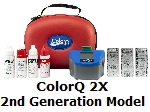 minum. Soft water conditions and low total
alkalinity can add to the problem. I don't know what the
useable life expectancy of your ladder is, but it should be
replaced, if there is a loss of structural integrity. There
are ladders, rails
and steps made from composite materials, that are better
able to resist the problematic effects of corrosion. Today's
ladders and rails are probably made in Asia and, in my
opinion, are not made of the same quality materials, used in
most American-Made products, made years ago. Proper water chemistry matters, if you want to
help protect your investment and assure proper sanitation
and bather comfort. The ColorQ
2X Digital Water Analyzers can
be used in all types of pools and with all types of
chemicals. With no color-matching or guesswork involved,
they have earned numerous best product awards. These
products are easy to maintain and do not require grounding,
making installation less complicated. I hope that I have
been of assistance. minum. Soft water conditions and low total
alkalinity can add to the problem. I don't know what the
useable life expectancy of your ladder is, but it should be
replaced, if there is a loss of structural integrity. There
are ladders, rails
and steps made from composite materials, that are better
able to resist the problematic effects of corrosion. Today's
ladders and rails are probably made in Asia and, in my
opinion, are not made of the same quality materials, used in
most American-Made products, made years ago. Proper water chemistry matters, if you want to
help protect your investment and assure proper sanitation
and bather comfort. The ColorQ
2X Digital Water Analyzers can
be used in all types of pools and with all types of
chemicals. With no color-matching or guesswork involved,
they have earned numerous best product awards. These
products are easy to maintain and do not require grounding,
making installation less complicated. I hope that I have
been of assistance.
Sincerely. Alan Schuster,
6/23/2020
►
Ladder Corrosion?
My ladder
keeps getting rust build up, can it be eliminated? Chlorine
pool.
Gene P., Ft
Myers, FL 1/1/2015
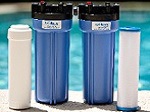
Make sure that the ladder is bonded and grounded. If it is,
then it is possible that the ladder is made of a poor
quality stainless steel. If the ladder was made in China,
that would not be unexpected. The TDS of the water may be
playing a role. The higher the TDS, the more aggressive any
corrosion, if two dissimilar metal are in immediate contact.
Most likely the discoloration is due to the presence of
dissolved iron, in the source water. Have the water
tested for iron and treat accordingly, with a product
designed to remove metals, before the water is added to the
pool. A MetalTrap Dual
Cartridge Filter can solve the problem, over the long
haul. If you ever
opt to replace the ladder, I suggest that you consider one
made of composite materials, as they are corrosion
resistant. I hope that this information will be helpful.
Sincerely. Alan Schuster, 1/2/2015
► Ryznar
Stability Index?
What is the Ryznar Stability Index and
how does it help protect heaters and other equipment, from
corrosion?
Austin S., 8/15/2011
An article appeared in the 8/12/11 issue of Pool & Spa News
about the Ryznar Stability Index. This index is favored, by some
heater and equipment manufacturers, because it affords
greater protection against corrosion, than does the more
familiar Langelier Index. It favors higher calcium hardness
levels and/or higher pH levels. While this will lessen the
possible the corrosive effects of softer, lower pH water, it
comes at a price. It boosts the calcium hardness to a point,
where scale begins to form, which actually helps protect the
equipment, from corrosion. However, as scale forms in the
heater, it reduces the efficiency, by acting as an
insulator. In a filter, it acts to cement the filter media,
reducing the effectiveness of the filter. In areas of the
southwest, the water is already too hard, right out of the
tap and it is challenging to main a clear pool, without
excessive scaling. For more information, go to this website
page: Ryznar Stability Index I hope that this information
will help you better protect your pool equipment.
Sincerely. Alan Schuster 8/19/2011
► Corrosion
Concerns?
We are in the market for a pool. We
are trying to find out the facts on saltwater vs.
chlorinated pools. We had one guy trying to sell us a
saltwater pool. We were told by another pool builder that
they love saltwater pools, but stopped building them because
the water was eating up the coping.
Shawn M., 4/17/2012
There are millions of pools with
salt chlorine generators
out there and all have coping, of various types. My first
Lectranator salt chlorine generator usage was nearly 30
years ago. Possibly, there are some types that do not fare
well with salt chlorinated pools or any water with hi gh
total dissolved solids (TDS. Some natural stones could be
ill-suited to use in any type of pool and should be avoided,
unless properly sealed against the elements. The problem is
that natural stones can vary considerably, even when the
names are the same. You are only adding 2500-3000 PPM of
salt: ocean water is 15 times higher. Some of the water in
Arizona and elsewhere contains 1500 PPM or more, right out
of the tap. A five year old pool on regular chlorine could
easily top 3000 PPM. High levels of chlorine, which salt
chlorine generators help avoid, is usually even more
damaging. I suggest discussing this with the builder.
Choosing a pool built of the right materials should
eliminate problems. It is easier to use and control, as
compared to standard chlorine products and that accounts for
its huge popularity. About 90% of pools in Australia, where
salt chlorine generator originated over 30 years ago, have
these units in operation and they use coping, decking and
everything else. Some coping, decking and stone features may
have to be sealed, with an appropriate product, to protect
them, not only from the effects of salt, but from the
effects of pool water and the elements, in general. I hope
that I have been helpful. gh
total dissolved solids (TDS. Some natural stones could be
ill-suited to use in any type of pool and should be avoided,
unless properly sealed against the elements. The problem is
that natural stones can vary considerably, even when the
names are the same. You are only adding 2500-3000 PPM of
salt: ocean water is 15 times higher. Some of the water in
Arizona and elsewhere contains 1500 PPM or more, right out
of the tap. A five year old pool on regular chlorine could
easily top 3000 PPM. High levels of chlorine, which salt
chlorine generators help avoid, is usually even more
damaging. I suggest discussing this with the builder.
Choosing a pool built of the right materials should
eliminate problems. It is easier to use and control, as
compared to standard chlorine products and that accounts for
its huge popularity. About 90% of pools in Australia, where
salt chlorine generator originated over 30 years ago, have
these units in operation and they use coping, decking and
everything else. Some coping, decking and stone features may
have to be sealed, with an appropriate product, to protect
them, not only from the effects of salt, but from the
effects of pool water and the elements, in general. I hope
that I have been helpful.
Sincerely. Alan Schuster,
4/17/2012
► Corrosion
of Stainless Steels Rails and Welds?
I am the Property Manager of a
condominium in Pennsylvania. The Pool that is in the
building is a Salt Water, Indoor, Stainless Steel Shell with
Tile over the Steel. Since day one (July 18, 2008) we are
experiencing rusting around all weld joints and hand
rails. The Pool Consultants are trying to say it is a
"stray current" going through the pool. Although I am not an
expert on Pools, I feel that the water in the Pool is not
balanced. Please help, it is embarrassing to have residents
swimming in a "rusty" pool. I believe it is a pH issue,
perhaps also that the piping was installed with all copper
instead of PVC and we lost two pumps to corrosion. I also
think it has something with the air temperature inside
the Pool room itself. Again, if you could be so kind and
help in anyway you would be my hero!
Michelle S., PA, 3/29/2011
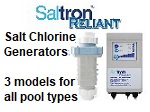
It could be a grounding issue and I suggest having this
checked. Salt chlorine generators tend to make the pH rise,
requiring regular additions of acid. High pH should not
corrode copper, even if chlorine is present. The rails or
welds could be of lesser quality materials and could be more
subject to rusting. There are composite rails, steps and
ladders that are unaffected by the water chemistry and do
not need grounding. Have the water tested for iron and
copper and treat, as needed. Needless to say, keeping
the pH in the proper 7.2-7.8 range will always help, but is
not always enough to solve the problem. I hope that I have been
helpful.
Sincerely. Alan Schuster, 3/30/2011
► Avoiding
Corrosive Situations?
We have had a salt chlorinator for 3
yrs now. The first year was good, but we had trouble getting
our ladder and rails out at the end of the summer. The next
year was okay but we ended up having to cut the ladder and
rails off to get them out of the holes and had to buy new
ones. Last summer was real rainy at the beginning of the
summer season and we had a hard time regulating the pool
readings. The pool light casing was totally corroded and had
to be replaced and we, again, had a hard time getting the
ladder and rails out. Are we the only people who have had
these problems? Our pool company hasn't had many suggestions
for us and said they only have a couple of customers with
these types of problems. Any suggestions? Thank you.
Lori H., Michigan, 5/19/2009
Due to the drastic increase in the cost of nickel during the
past several years, stainless steel has become very
expensive. Manufacturers have attempted to save by using
lower grades of Stainless (less nickel), thinner walls (less
material), and by importing from China. China is currently
the main source of stainless steel pool rails sold in the
US. They are inexpensive, but for the most part of inferior
quality. That, combined with the increase in popularity of
salt chlorinators has led to many problems. You are not
alone by any means. I realize this is no consolation. Pools
that are over 15 years old are less likely to be affected,
as the quality of rails and ladders installed at that time
was superior to those that are on the market now. The older
ones are. therefore. less affected by salt or chemicals.
Unless one specifies marine-grade 316 Stainless Steel (which
is expensive and NOT the standard), a salt-chlorinated pool
that uses steel rails is very likely to degrade. In the
fine-print on the warranties of most stainless steel rails
and ladders, they all but guarantee that their rails will
corrode, if chemical balance isnít precisely maintained at
all times. The above applies to any steel products in pools.
Most fittings and pool accessories are now made of plastics,
but rails, ladders and a few accessories like rims around
lights are holdouts. The only solutions are to either
A: Maintain PRECISE chemical balance in your pool at all
times.
B: Change your steel rails or ladders for a non-steel
alternative, such as products made of Composite Materials.
C: Find a manufacturer that can provide 316 Stainless if you
prefer the look of steel.
D: Expect to have to continue replacing your ladder every
two or three years.
Corrosion is not limited to pools with
salt chlorine
generators. Even pools, using ordinary liquid chlorine, will
have salt content that can rise quite high, after just a few
years. The key factor is to avoid corrosive chemistry, avoid
having two dissimilar metals in immediate proximity to one
another and choose a quality alternative, such as rails and
ladders manufactured of composite materials. I hope that
this information will be helpful, in understanding the
problem and making the right choice.
Sincerely. Alan Schuster, 5/19/2009
► Copper And
Heat Exchanger Corrosion?
Alan, my copper level at closing last
winter was 0.5 ppm, measured with a test kit. This occurred
when my second heat exchanger dissolved into the pool water.
(Long story - installer paid for his error and replaced
second heat exchanger). No copper ever added to pool on
purpose (i.e. no copper-based algaecide). After the first
heat exchanger was dissolved (like I said, a long story),
the entire plaster pool surface was stained blue-green.
Drain, acid wash, refill. Stain gone (all at installers
expense - at least he's honest). Now we're on the second
round. Problem root cause fixed, 3rd heat exchanger now in
place, but, as I said, 0.5 ppm copper remains from dissolved
heat exchanger number 2. Question: What's the best way to
get rid of the copper? I'd rather get rid of it than
sequester it. Naturally, I'd like to avoid another drain and
refill. I've heard that there are products that can remove
copper. Have you had any experience with this? pH is always
on the high side, around 7.6. I'm afraid the copper is going
to precipitate out any day now. My wife says she can see
little green spots on the white plaster. My eyes are not
that keen, but I want to nip this in the bud! I'm a
scientist and an engineer, so I like to know what's going
on, even if I let someone else do the work! Also, my
installer, though honest, needs some direction. Thanks for
your advice!
David S., Colts Neck, New Jersey, 4/25/2011
That's quite a story. Sounds like someone put a chlorinator
in front of the heater and this resulted in the corrosion of
the copper h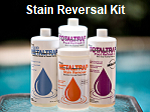 eat exchanger. The only way to deal with the
copper is by chelating the copper. This will complex the
copper and allow it to remain in solution, thereby avoiding
the risk of precipitation or discoloration. Mineral
Treatment products use the
term "remove" in a very general sense. They actually mean
"helps control." These products do not physically remove the
copper. A concentration of 0.5 PPM is comparable to that of
a copper algaecide. To deal with heavy
metals, such as iron, copper and manganese, a
MetalTrap Stain Reversal Kit,
available in our
website store, contains the complete regimen of products,
required to remove the stains, eliminate the metals from the
water and help assure that a recurrence does not happen.
Allowing the pH to remain at 7.6 or above, decreases the
solubility of copper and increases the likelihood of
staining and precipitation. To better assure proper overall
pool water chemistry, visit a pool store that has a very
reliable, professional lab such as a
WaterLink SpinTouch Lab, rather than a less accurate test kit
or strip reader. I hope that I have been
helpful. Enjoy the season and the heater. eat exchanger. The only way to deal with the
copper is by chelating the copper. This will complex the
copper and allow it to remain in solution, thereby avoiding
the risk of precipitation or discoloration. Mineral
Treatment products use the
term "remove" in a very general sense. They actually mean
"helps control." These products do not physically remove the
copper. A concentration of 0.5 PPM is comparable to that of
a copper algaecide. To deal with heavy
metals, such as iron, copper and manganese, a
MetalTrap Stain Reversal Kit,
available in our
website store, contains the complete regimen of products,
required to remove the stains, eliminate the metals from the
water and help assure that a recurrence does not happen.
Allowing the pH to remain at 7.6 or above, decreases the
solubility of copper and increases the likelihood of
staining and precipitation. To better assure proper overall
pool water chemistry, visit a pool store that has a very
reliable, professional lab such as a
WaterLink SpinTouch Lab, rather than a less accurate test kit
or strip reader. I hope that I have been
helpful. Enjoy the season and the heater.
Sincerely. Alan Schuster, 4/25/2011
► Rising Salt
Level?
I recently bought a
Tracer
PockeTester, from your website. I am quite satisfied,
with the convenience and reliability of the tester, which I
use to monitor the salt levels in the pools, on my service
route, that have a salt chlorinator. While I like the
convenience of a salt chlorine generator, I never got around
to putting one on my pool, in the 3 years since it was
built. I use a combination of a trichlor feeder and lithium
shock. For no other reason, other than curiosity, I tested
the tap water and found a salt level or 600 PPM. That is not
uncommon or unexpected in this area. I then tested the pool
water and found a salt level of 2000 PPM. That came as a
major surprise, since I have never added any salt. Is there
an explanation?
Stephen S., 6/30/2010
Evaporation!!! There is nothing wrong with the
Salt
PockeTester, as I will explain. Finding high levels of salt
or TDS is nothing new and affects most pools, that are a few
years old. Assuming that you have a typical inground pool,
you can lose 2-inches of water a week. Possibly
 more, in the
summer, in a hot dry location. That 2-inch loss represents
2-3% of the water volume, depending on the presence and size
of the hopper area. Even allowing for rainfall to replenish
1/2 of the lose, you are still adding about 10 PPM of salt,
every time, you top off the pool, with the water containing
600 PPM of salt. 10 PPM a week, for 3 years, and you can
easily reach 2,000 PPM of salt: almost as much as some pools
with salt chlorine generators. Pump outs, splash outs and
backwashing will slow the rate of increase, However, no
matter what the salt level will rise substantially, over
time, when you are dealing with water than contains 600 PPM
of salt. If you were to use liquid chlorine the rate of salt
increase would be even higher. Measure your own average
weekly evaporational water loss and calculate the % lost.
Multiply this by the PPM of salt content of the new water
and you have the weekly rise in salt. You don't have to have
a salt chlorine generator to end up with salt in the pool.
The levels are not enough to taste, so it goes by unnoticed,
so long as the overall water chemistry is good. If the pool
did have the salt chlorine generator, with water containing
the appropriate amount of salt, the levels would rise even
more. When the salt level gets too high, water should be
replaced. Thank you for writing an for encouraging me to put
it to the numbers test. more, in the
summer, in a hot dry location. That 2-inch loss represents
2-3% of the water volume, depending on the presence and size
of the hopper area. Even allowing for rainfall to replenish
1/2 of the lose, you are still adding about 10 PPM of salt,
every time, you top off the pool, with the water containing
600 PPM of salt. 10 PPM a week, for 3 years, and you can
easily reach 2,000 PPM of salt: almost as much as some pools
with salt chlorine generators. Pump outs, splash outs and
backwashing will slow the rate of increase, However, no
matter what the salt level will rise substantially, over
time, when you are dealing with water than contains 600 PPM
of salt. If you were to use liquid chlorine the rate of salt
increase would be even higher. Measure your own average
weekly evaporational water loss and calculate the % lost.
Multiply this by the PPM of salt content of the new water
and you have the weekly rise in salt. You don't have to have
a salt chlorine generator to end up with salt in the pool.
The levels are not enough to taste, so it goes by unnoticed,
so long as the overall water chemistry is good. If the pool
did have the salt chlorine generator, with water containing
the appropriate amount of salt, the levels would rise even
more. When the salt level gets too high, water should be
replaced. Thank you for writing an for encouraging me to put
it to the numbers test.
Sincerely. Alan Schuster, 7/1/2010
► Salt
Corrosion?
I am a pool builder and am totally
sold on salt chlorine generators. They are great. However,
there is one sticky point I need to clarify with my
potential customers. Corrosion. As I am located in
Toronto Canada, we use salt on our roads in winter and it
rusts our cars over time. Everybody knows it. I know that
the levels are much higher than in a pool. Can you please
provide me with some data on the corrosive elements of a
salt chlorine generator, so I can answer these objections.
Any help would be greatly appreciated. Thanks.
Bill D., Toronto, Ontario, 3/4/2018
The parts of the cars that rust are made of ferrous metals
(steel) and possibly some other metals or alloys. There is
no doubt that salt will have a negative effect on cars.
However, pools are not made of ferrous metals. The salt add
to a salt chlorinated pool will only result in corrosion, if
two dissimilar metals are in immediate proximity to one
another. Without this relationship being present, there will
be no corrosion due to the salt. Even pools without a
salt
chlorine generators present, can have significant levels of
salt and TDS. Relentlessly, evaporation causes salt and TDS
level to rise. Pump, filter and accessory manufacturers have
long known about this problem and the newer products are
designed with the thought that a salt chlorine generator
might be in use. If the pool walls are steel, the liner
separates the water from the steel. Gunite pools have
finishes that are salt water tolerant and fiberglass pools
are completely unaffected. If the ring on an underwater
light is stainless steel and the screws that hold it in
place are chrome-plated brass, they will completely dissolve
over time. If the screws are stainless steel, there is not
longer a corrosion problem. The overall pool water chemistry
must be maintained within the accepted parameters, as with
any pool. Testing the salt level helps to get proper
performance and helps assure longer life for the salt-cell.
I hope that I have put your mind at ease. dissimilar metals are in immediate proximity to one
another. Without this relationship being present, there will
be no corrosion due to the salt. Even pools without a
salt
chlorine generators present, can have significant levels of
salt and TDS. Relentlessly, evaporation causes salt and TDS
level to rise. Pump, filter and accessory manufacturers have
long known about this problem and the newer products are
designed with the thought that a salt chlorine generator
might be in use. If the pool walls are steel, the liner
separates the water from the steel. Gunite pools have
finishes that are salt water tolerant and fiberglass pools
are completely unaffected. If the ring on an underwater
light is stainless steel and the screws that hold it in
place are chrome-plated brass, they will completely dissolve
over time. If the screws are stainless steel, there is not
longer a corrosion problem. The overall pool water chemistry
must be maintained within the accepted parameters, as with
any pool. Testing the salt level helps to get proper
performance and helps assure longer life for the salt-cell.
I hope that I have put your mind at ease.
Sincerely. Alan Schuster, 3/5/2018
► When To
Replace Copper Pipes?
You've answered some pool questions
for me before and I trust you so I wanted to get your
opinion on this. We are getting estimates for new plaster
and possibly new pool decking right now. I was just told
that we need to replace the copper pipes with PVC before
re-doing the decking because copper will only last about 30
years (our house is 40 years old, swimming pool at least 30
years old) and they will start leaking soon and consequently
ruin the decking we put in. Is this true? Appreciate your
time and feedback.
Karen C., 2/11/2009
I don't know if you can assign a finite life to copper
pipes. Your contractor is trying to convince you to spend
some money now, while new decking is being installed, rather
than risk a much greater expense down the road, should the
pipes fail. In that respect, he is making you aware and
allowing you to decide. Thirty years might be reasonable,
but so much depends on how the pool was maintained. If the
pool was allowed to remain in acidic conditions, with
chlorine present, copper corrosion WILL occur. The longer
these conditions persist, the more corrosion occurs. If a
trichlor feeder was placed up stream of copper pipes,
corrosion could result. I assume that you have not owned the
pool, for these 40 years, and maintenance questions are
unknown. If it were my decision, I would opt to replace the
pipes. PVC pipes would allow you wide latitude to use a
salt chlorine
generator, if you so decided. With copper pipes, the salt
might corrode any soldered joints. I hope that this
information is helpful.
Sincerely. Alan Schuster, 2/11/2009
► Why Not A
Low pH?
If chlorine works better at lower pH
readings, why not keep the pH lower than 7.2-7.6?
Anonymous, 5/3/2009
Chlorine does work better at a pH below 7.2. However, there
are consequences that will result. Corrosion can present a
problem below 7.0. As the pH falls below 7.2, chlorine can
become increasingly more aggressive and irritating. The pH
of the eye fluid is 7.6 and, as you move further away,
discomfort can increase. Depending upon the type of pool -
vinyl lined or masonry - corrosive low pH conditions can
cause surface etching, liner wrinkling and equipment damage.
A pH of 7.2-7.6, helps assure bather comfort, allows
effective sanitizing and helps avoid corrosion. I hope that
I have answered the question.
Sincerely. Alan Schuster, 5/3/2009
► Pool Liner
Wrinkles?
When my vinyl liner was installed a
few years ago, it nice and smooth. Today, I see some
wrinkles in one area. What's the cause?
Barry D., Cinc., OH, 7/13/2009
Two things come to mind. It is possible that the bottom has
undergone some shifting and/or settling over the past few
years and this has led to some wrinkling. Another
possibility is that corrosive, acidic water conditions have
caused the vinyl liner to increase water absorption and this
has led to a stretching of the liner and the wrinkles. Is it
possible that you have been keeping the pH too low? It is
important to maintain the pH in the 7.2-7.6 range for bather
comfort, sanitizer efficiency and to help protect the pool
equipment! Low pH can be quite common with the use of
trichlor tablets in an automatic chlorinator because the
product is acidic and requires regular pH
monitoring. Because the water looks good, many people tend
to neglect the pH. The practice of "dumping" in chemicals
and allowing them to remain on the bottom, for prolonged
periods, is not recommended. Acidic chemicals such as pH
decreaser, muriatic acid or cyanuric acid can create the
acidic conditions that can contribute to this problem.
Always take care to broadcast or distribute all chemicals,
so as to avoid local high concentrations and lessen the
likelihood of problems. I hope that I have been helpful.
Sincerely. Alan Schuster, 7/13/2009
► Rough
Surface, Grayish Color And Hives?
We have a gunite pool that was
installed last Spring (2003), and have had a company
servicing the pool since then. Our plaster has gotten
rougher, and is pitted around some of the marker tiles. Is
this normal aging (in one year) or what would be likely
causes? Also, we have areas in the plaster that have been
grayish since installation, but the pool company said that
was normal, what do you think? Last, my children and my
husband have experienced a hivish sort of rash, with extreme
itching, the last few times they were in the pool/spa, but
the pool serviceman said nothing he put in should cause
that. Any ideas? Thanks.
Brenda P., 5/3/2010
It sounds like corrosive water conditions: low pH. That
would explain the pitting and roughing u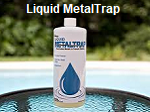 p of the surface. If
you have a heater, it could also explain the graying of the
surfaces. Acidic water conditions
cause chlorine to be more
aggressive and irritating and this fits it with what you are
describing. If your pool is being maintained on slow
dissolving chlorine tabs in a feeder, it sounds like little
or no attention is being paid to the pH. Have the pH total
alkalinity and calcium hardness tested. If you have a
heater, have the water tested for copper and add a couple of
doses of a quality metal treatment, such as phosphate-free
Liquid MetalTrap, at least 6 hours before
raising the pH. Proper chemistry won't repair the surface,
but should prevent a further worsening. No, this is not
normal! Hope the information helps. p of the surface. If
you have a heater, it could also explain the graying of the
surfaces. Acidic water conditions
cause chlorine to be more
aggressive and irritating and this fits it with what you are
describing. If your pool is being maintained on slow
dissolving chlorine tabs in a feeder, it sounds like little
or no attention is being paid to the pH. Have the pH total
alkalinity and calcium hardness tested. If you have a
heater, have the water tested for copper and add a couple of
doses of a quality metal treatment, such as phosphate-free
Liquid MetalTrap, at least 6 hours before
raising the pH. Proper chemistry won't repair the surface,
but should prevent a further worsening. No, this is not
normal! Hope the information helps.
Sincerely. Alan Schuster, 5/3/2010
|
Visit The Website Stores . . . for
better informed shopping!!! |
|
 |
Shipping is FREE* . . . within
the Continental U.S.
A $9.99
handling charge will apply
to Continental U.S. Orders,
under $75.00. Orders
outside of the Continental
U.S. may require some
additional charge, based on
quantity and destination.
Most products can be
shipped World-Wide. International
and orders outside of
Continental U.S. - see
comments on the ordering
pages. |
|
 |

Major
Credit Cards and PayPal are accepted. |
|
▲
Return To Top Of Page
▲
Aqualab Systems, LLC does not
make any warranty or
representation, either expressed
or implied, regarding the
accuracy or completeness of the
information provided by this
website; nor does Aqualab
Systems., LLC. assume any
liability of any kind whatsoever
related to, or resulting from,
any use or reliance on this
information. The content of this
website should not be used, if
it is conflict with any
applicable federal, state or
local regulations or guidelines.
© Aqualab Systems, LLC. All
rights reserved
|
|










